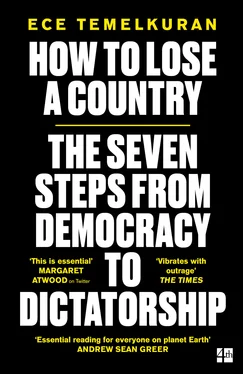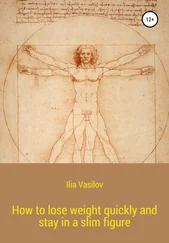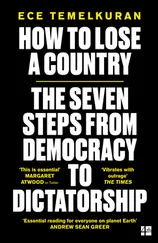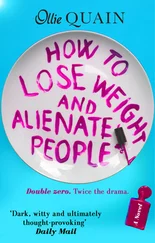‘We are Muslims too.’
This was the most frequent introduction offered by social democrat participants in TV debates in the first years that the AKP held power in Turkey. Just as what constituted being part of the we , ‘the real, ordinary, decent people’, meant supporting Brexit in Britain or accepting a bit of racism in the Netherlands, so did being conservative, provincial Sunni Muslim in Turkey. Once the parameters had been set by the original owners of we , everyone else started trying to prove that they too prayed – just in private. Soon, Arabic words most people had never heard in their lives before became part of the public debate, and social democrats tried to compete with the ‘real Muslims’ despite their limited knowledge of religion. The AKP spin doctors were quick to put new religious concepts into circulation, and critics were forever on the back foot, constantly having to prepare for pop quizzes on ancient scriptures.
One might wonder what would happen if you passed all the tests for being as real as them, as I did once. In 2013, after studying the Quran for over a year while writing my novel Women Who Blow on Knots , I was ready for the quiz. When the book was published I was invited to take part in a TV debate with a veiled AKP spin doctor – a classic screen charade that craves a political catfight between a secular and a religious woman. As I recited the verse in Arabic that gave the title to my novel and answered her questions on the Quran she smiled patronisingly and said, ‘Well done!’ I was politely reminded of the fact that I was at best an apprentice of the craft she had mastered, and somehow owned. She made it very clear that people like me could only ever inhabit the outer circle of the real people . No matter how hard we toiled, we could only ever be members of the despised elite. Any attempt to hang out at one of Nigel Farage’s ‘real people’s pubs’ or a Trump supporters’ barbecue would doubtless end with a similar patronising smile, and maybe a condescending pat on the shoulder: ‘Way to go, kiddo!’
One of the interesting and rarely mentioned aspects of this process is that at times the cynical and disappointed citizens, even though they are critical of the movement , secretly enjoy the fact that the table has been messed up. The shocked face of the establishment amuses them. They know that the massive discontent of the neglected masses will eventually produce an equally massive political reaction, and they tend to believe that the movement might have the potential to be this long-expected corrective response to injustice. Until they find out it is not. ‘The insinuation that the exterminator is not wholly in the wrong,’ says J.P. Stern, ‘is the secret belief of the age of Kafka and Hitler.’ ¶The limitless confidence of the movement is not, therefore, entirely based on its own merit; the undecided, as well as many an adversary, can furnish the movement with confidence through their own hesitations. After all, there’s nothing wrong with saying the establishment is corrupt, right? By keeping its ideological goals vague and its words sweet, the movement seduces many by allowing them to attribute their own varying ideals or disappointments to it. What is wrong with being decent and real anyway? The vagueness of the narrative and the all-embracing we allow the movement’s leader to create contradictory, previously impossible alliances to both the right and the left of the political spectrum. The leader, thanks to the ideological shapelessness of the movement, can also attract finance from opposite ends of the social strata, drawing from the poorest to the richest. Most importantly, as the leader speaks of exploitation, inequality, injustice and consciousness, borrowing terminology and references from both right- and left-wing politics, growing numbers of desperate, self-doubting people, and a fair few prominent opinion-makers besides, find themselves saying: ‘He actually speaks a lot of sense. Nobody can say that a large part of society wasn’t neglected and dismissed, right?’
‘I don’t understand how they won. I’m telling you, lady, not a single passenger said they were voting for them. So who did vote for these guys?’
This was the standard chat of taxi drivers in Turkey after the AKP’s second election victory. As a consequence, ‘So who did vote for these guys?’ became a popular intro to many a newspaper column. Clearly neither taxi drivers nor the majority of opinion-piece writers could make sense of the unceasing success of the movement, despite rising concerns about it. After hearing the same question several times, I eventually answered one of the taxi drivers with a line that became the intro to one of my own columns: ‘Evidently they all catch the bus.’
After the Brexit referendum, many people in London doubtless asked themselves a similar question. If I’d been a British columnist, the title for my column might have been ‘The Angry Cod Beats European Ideals’. Among the groups who voted Leave in the referendum were Scottish fishermen, who have obsessed for many years over the fact that European fishermen were allowed to fish in Scottish waters, as well as pissed off about an array of other European things that are of next to no consequence to Scotland. Similarly, in countries such as Hungary and Poland where right-wing populism is in control of the political discourse there has always been a ‘condescending Brussels elite’, or ‘the damn Germans’, who stand in the way of better lives for ordinary men, as well as the nation’s ‘greatness’.
I am aware that what I have written above might seem like the condescending remarks of a cosmopolitan, unreal person , and that there is, of course, a real and solid sense of victimhood behind all of these new movements: many of their members are indeed the people who catch the bus, and who have seen the price of their fish and chips rise. It would therefore, as Greek economist and former finance minister Yanis Varoufakis says, be inconsequential mental gymnastics for intellectuals to analyse these movements only ‘psychoanalytically, culturally, anthropologically, aesthetically, and of course in terms of identity politics’. **And I agree with him on the fact that ‘the unceasing class war that has been waged against the poor since the late 1970s’ has been intentionally omitted from the narrative, and carefully kept outside the mainstream global discussion. Moreover, these right-wing populist movements can, in fact, also be seen as newly-built, fast-moving vehicles for the rich, a means for the ruling class to get rid of the regulations that restrain the free-market economy by throwing the entire field of politics into disarray. After all, there is certainly real suffering, genuine victimhood behind these movements.
However, they do not only emerge from real suffering, but also from manufactured victimhood. In fact, it is the latter that provides the movement with most of its energy and creates its unique characteristics.
In Turkey, the manufactured victimhood was that religious people were oppressed and humiliated by the secular elite of the establishment. For Brexiteers it is that they have been deprived of Britain’s greatness. For Trump voters it is that Mexicans are stealing their jobs. For Polish right-wing populists it is Nazis committing crimes against humanity on their soil without their participation and the global dismissal of the nation’s fierce resistance to the German invasion in 1939. For Germany’s AfD (Alternative für Deutschland) it is the ‘lazy Greeks’ who benefit from hard-working real Europeans, etc. The content really doesn’t matter, because in the later stages it changes constantly, transforms and is replaced in relation to emerging needs and the aims of the movement.
Читать дальше












